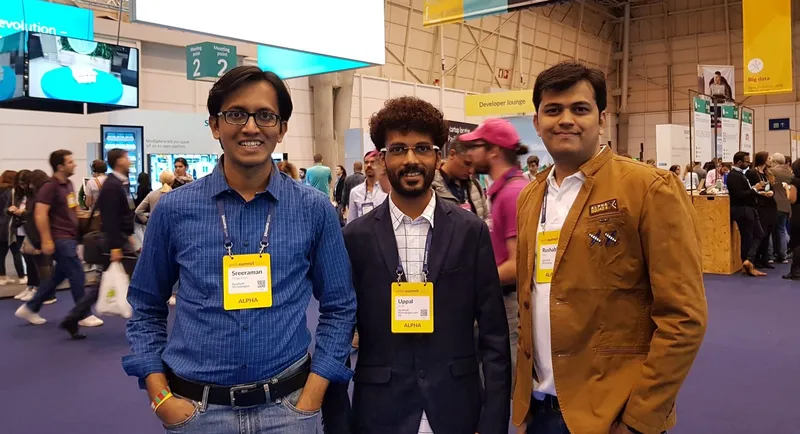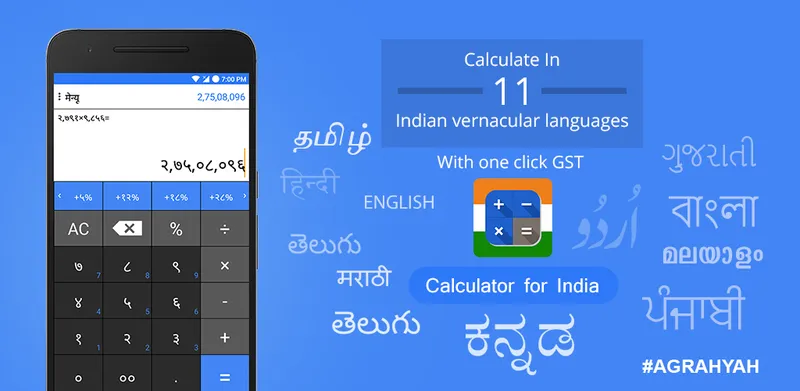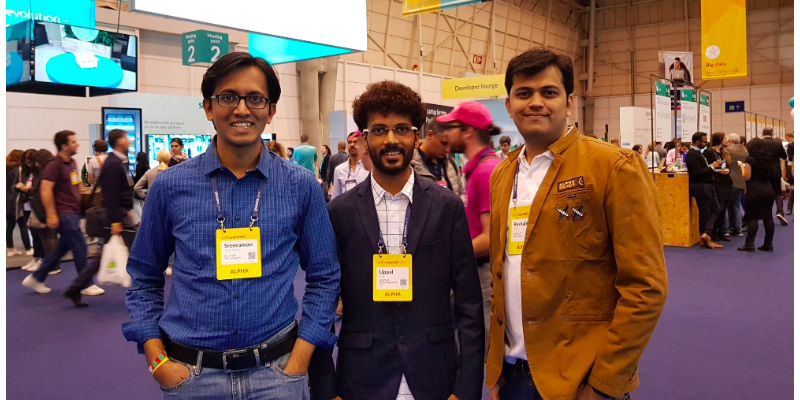Mumbai-based Agrahyah Technologies is riding the voice and vernacular wave on the internet
Agrahyah is building a suite of Indian language mobile apps, voice products, and digital content for Amazon, Google, and other platforms.
At the flagship ‘Google for India’ conference last week, the search giant underscored the importance of the ‘3Vs’ driving India’s internet universe - voice, video, and vernacular.
While the first batch of our internet users consumed English-language content, the majority of new users are “Indian language” consumers, and this number is expected to reach 500 million by 2020, Google stated.
Google says it is “making the internet work for more Indians and making products more relevant to Indians”. But a host of local product developers and content creators are riding the vernacular wave too.
They too want a share of the lucrative ‘500-million-users-by-2020’ pie and make the internet more accessible to the average Indian. Mumbai-based Agrahyah Technologies is one such company.
Agrahyah is a software firm and a content producer rolled into one. It is building a suite of apps, websites, content platforms, and voice-based products for India’s surging vernacular population.

It was founded in October 2016 by Sreeraman Thiagarajan, Uppal Shah, and Rushabh Vasa, and it began operations in early 2017. Sreeraman is a marketing industry veteran having headed the digital division of Publicis in his last role. Uppal too has a digital marketing background, while Rushabh is a serial tech entrepreneur with a knowledge of software.
Both Sreeraman and Rushabh were members at the Google Business Group (GBG) – Mumbai, a local community of tech and digital media professionals. “We were always inclined to do something on our own, and we identified something big in 2016,” Sreeraman tells YourStory.
He explains:
“If the web were a 100-page book, English content took up 55 pages, Russian was second around 7, then there were some others, and all Indian languages put together were less than a page. That is an abysmally low quantum of content, more so when Hindi, Bengali, and Tamil are some of the most-spoken languages in the world. So, we saw a definite need for non-English content on the web.”
Bridging the gap in vernacular web
The co-founders went about “validating the problem statement” by holding discussions with peer groups and industry people. When demonetisation happened in November 2016, they stood vindicated.
Sreeraman says,
“During demonetisation (when the switch to cashless transactions was happening), we realised that people got stuck because their banks sent OTP instructions in English. We could see language becoming a barrier in digital adoption.”
Agrahyah Technologies set out to bridge that gap with its suite of vernacular mobile apps, voice products and digital content built from ground-up.
In about a year-and-a-half, it has developed apps, websites, Amazon Alexa skills, and a voice-based content platform. Agrahyah’s focus has been Hindi, which is growing the fastest when it comes to digital adoption - 39 percent, according to a Google-KPMG report. More languages would be added in future. The products are distributed via Android, web, Amazon Echo, and Google Home.

Agrahyah’s first product was an Android app - Calculator for India - that supports 11 vernacular languages. It launched early last year and is currently rated 4.6 out of 5 on Google Play Store. Sreeraman says,
“A bulk of India still uses Android phones which run on Jellybean or Ice Cream Sandwich and these don’t even recognise Indian fonts. So, we built a calculator app to make it work specifically on old Android phones.”
Building for Amazon Alexa
Apart from creating its own IP products, Agrahyah is also listed as a preferred partner by Amazon India for Alexa Skills development. Last month, it launched the India Panchang (in Hindi) as an Alexa skill on Amazon Echo devices.
The India Panchang brings the Hindu solar system-based almanac to the digital platform. It allows users to refer to it through a simple voice command on Alexa, and get instant information on muhurats, karna, rashi, yoga, nakshatra, and more. Incidentally, Agrahyah is also building an Alexa skill for Hindi jokes.
Co-founder Sreeraman observes,
“We are building products that are culturally and contextually relevant to the market we operate in. Voice can connect with people in a fundamental way and helps in technology percolating into their lives for a better tomorrow.”
While Alexa and other voice-based platforms are in vogue now, the content is still largely skewed towards English. And that hinders adoption in a market like India where nine out of 10 internet users seek local language content (Google-KPMG report). Hence, global corporations like Amazon are seeing value in “ecosystem partners” like Agrahyah.
In a prior conversation with YourStory, Puneesh Kumar, Country Manager – India, Alexa Experiences and Devices at Amazon, said,
“Customers themselves are making Echo more Indian. When we launched here, it was the first time we entered a country where there were so many languages and so much diversity. We were very aware that enabling the device in English only was not going to cut with customers.”
Voice-based content platform
Agrahyah is also developing its own voice-based platform, Aawaz.com, which is slated for launch in the next few weeks. Aawaz.com seeks to marry two of the three Vs - voice and vernacular - driving the Indian internet right now. “Voice is the next frontier because not everyone knows how to type,” says Sreeraman.

Aawaz.com will house Hindi audio content spanning across genres from mythology and Bollywood to health, wellness, career and relationships. Over 100 hours of voice content would be available at launch. Urdu content will also be rolled out starting next year.
Sreeraman says, “Everything from script and voiceover to recording for Aawaz.com is being done in-house. Out of 33 members in our team, 20 are scriptwriters. We want to ensure the highest levels of quality and authenticity. Getting the nuances right in voice products is a challenge because every region in India has a different need. The Hindi in Bihar is not the same as that in UP.”
Operations, challenges
Agrahyah’s revenues come from enterprise customers in BFSI and pharma sectors as well from native advertisers who place branded content on its apps and websites. The startup is bootstrapped currently. “We’re not looking for funding until Aawaz.com reaches critical mass,” Sreeraman states.
While Agrahyah has identified a segment that is clearly poised for exponential growth in the coming years, it is not devoid of issues that typically plague bootstrapped startups. There is always a bigger player lurking somewhere, who is equipped with more funds, can build more products, create a wider distribution network, and suck up maximum customers.
Sreeraman though has a contrarian view. He says,
“In content, there is no competition, but only consumption. The market keeps expanding.”
Challenges, however, remain in distribution and content production. He says, “Players like Jio-Saavn or even radio channels can get a big celebrity to do content, and they can do it for loose change. We don’t have those kind of resources.”
Hence, getting the right talent is crucial. Agrahyah is hiring an equal number of software engineers and content producers, and will be a 50-member team by the end of the year.
For now, voice shows the way.











